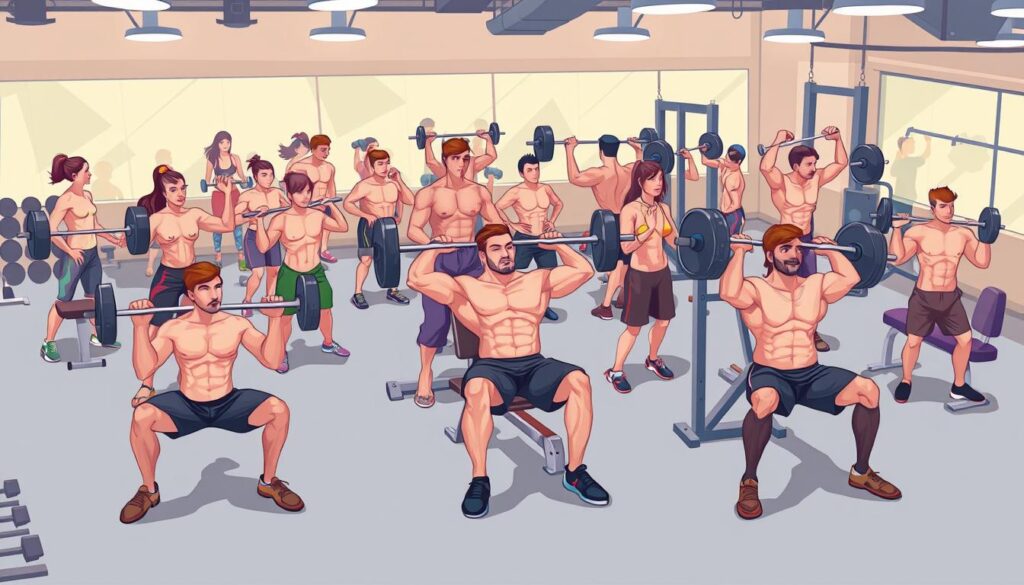Gaining muscle mass is a tough but rewarding journey. It can make you look better, perform better in sports, or just feel stronger. Knowing how to grow muscle is key. We’ll cover the science of muscle building, the best foods for weight gain, and how to create a good workout plan.
Key Takeaways
- Eating more calories than you burn, with a diet full of protein, carbs, and healthy fats, is key for muscle growth.
- Doing strength and cardio exercises 3-5 times a week can turn extra calories into muscle.
- Eating every 3 hours and not skipping meals helps you get more calories to gain muscle.
- Eating foods like fruits, veggies, olive oil, avocado, and nuts helps with healthy weight gain. Avoid processed and sugary foods.
- Talking to a registered dietitian can help make a diet plan that fits your needs and likes.
Understanding Muscle Growth Fundamentals
To grow muscles, you need to know the science. Muscle mass is important for health, strength, and balance. It also helps with metabolism.
The Science Behind Muscle Building
Muscle growth happens through protein synthesis. You need enough protein and to work out hard to grow muscles. By pushing your muscles, you make them bigger and stronger over time.
Key Factors Affecting Muscle Growth
- Eating more calories than you burn helps grow muscles. This extra energy builds new muscle tissue.
- Protein is key for muscle repair and growth. Eat about 1 gram of protein for every pound of your body weight. You can get protein from lean meats, fish, eggs, dairy, and plants.
- Do strength training like deadlifts, squats, and bench press. These exercises help grow muscles.
Role of Hormones in Muscle Development
Hormones like testosterone and IGF-1 are important for muscle growth. Testosterone helps build muscle. IGF-1 makes muscle cells grow and change, helping muscles develop.
Knowing how muscles grow and what affects it helps you plan to build muscle. This way, you can achieve the muscle mass you want.
Creating Your Caloric Surplus Strategy
To gain weight and build muscle, you need to eat more than you burn. This is called a calorie surplus. It’s key to eat enough extra calories for muscle growth without gaining too much fat.
Here’s a step-by-step guide to creating your calorie surplus strategy:
- Determine your maintenance calorie needs. This is the number of calories your body burns daily to maintain your current weight.
- Add 10-20% to your maintenance calories to create a calorie surplus. This typically translates to an additional 350-500 calories per day.
- Focus on nutrient-dense, high-calorie foods like lean proteins, complex carbs, and healthy fats. Aim for 0.7-1 gram of protein per pound of body weight daily.
- Eat every 3 hours to keep your metabolism revved up and support muscle growth. Incorporate plenty of fruits, vegetables, and whole grains into your meals.
- Track your progress by weighing yourself regularly. Adjust your calorie intake as needed to maintain a steady weight gain of 0.25-0.5% of your body weight per week.
| Metric | Recommendation |
|---|---|
| Calorie Surplus | 10-20% above maintenance calories |
| Weekly Weight Gain | 0.25-0.5% of body weight |
| Daily Protein Intake | 0.7-1 gram per pound of body weight |
| Macronutrient Ratio | 45-60% carbs, 30-35% protein, 15-30% fat |
Remember, a calorie surplus is essential for weight gain and muscle growth. But, it’s important to focus on clean bulking with nutrient-dense foods. This supports your overall health and fitness goals.
Essential Nutrients for Weight Gain Mass
To gain weight and build muscle, you need the right mix of nutrients. Focus on eating lots of protein, complex carbs, and healthy fats.
Protein Requirements and Sources
Protein is key for building muscle. The International Society of Sports Nutrition says you need 1.4 to 2 grams of protein per kilogram of body weight daily. If you do intense workouts, you might need up to 3 grams per kilogram.
Good protein sources are lean meats, fish, eggs, dairy, legumes, and plant-based powders. For example, salmon steak has 58.5 grams of protein in a 3-ounce serving. Whey protein isolate gives you 50 grams in a 3-scoop serving.
Carbohydrates for Energy and Growth
Complex carbs give you energy for workouts and help muscles grow. The ISSN says eat 45-55% of your calories from carbs. If you do lots of training, you might need more.
Good carb sources are whole grains, potatoes, corn, oats, rice, and legumes. For example, a cup of cooked buckwheat groats has 22.5 grams of protein and lots of vitamins and minerals.
Healthy Fats for Muscle Building
Healthy fats are important for muscle growth and health. Eat monounsaturated and polyunsaturated fats like nuts, seeds, avocados, and olive oil. For example, a cup of dry-roasted almonds has almost 29 grams of protein.
Eating the right mix of protein, carbs, and fats helps you gain weight and build muscle.
“Consuming 1.4–2 grams of protein per kilogram of body weight per day is recommended to maximize muscle building.”
Designing Your Training Program
To build muscle, you need a good training plan. It should work all major muscle groups. Aim for 3-5 workouts a week, mixing strength training and cardio.
Strength training is key. Use big exercises like squats, deadlifts, and overhead presses. These work many muscles at once, helping you grow more muscle.
- Do 8-12 reps per set. Use a weight that’s hard on the last few reps.
- Keep adding more weight, reps, or sets. This is called progressive overload.
- Try a split routine. Work different muscles on different days. This helps with recovery and growth.
For a custom plan, talk to a certified personal trainer. They’ll make a program just for you. It will fit your goals, fitness level, and schedule.
| Exercise | Sets | Reps | Weight |
|---|---|---|---|
| Barbell Squat | 4 | 8-10 | 175 lbs |
| Deadlift | 3 | 6-8 | 225 lbs |
| Bench Press | 4 | 8-10 | 135 lbs |
| Overhead Press | 3 | 8-10 | 95 lbs |

“To see muscle growth, you need to challenge your muscles with heavier weights and fewer reps. Aim for 8-10 reps per set, using a weight that’s heavy enough to be challenging on the last few reps.”
– Erin Oprea, Personal Trainer
Supplement Guide for Muscle Growth
To build muscle, you need a good plan. Supplements can help a lot. Let’s look at some key ones for muscle growth.
Creatine Benefits and Usage
Creatine is a top choice for boosting muscle strength and size. It can increase muscle creatine by up to 40%. This is great for both men and women, as women have less creatine than men.
The best way to take creatine is to start with a loading phase. Take 0.3 grams per kilogram of body weight daily for a few weeks. Then, take 0.03 grams per kilogram daily for 4 to 10 weeks.
Protein Supplements and BCAAs
Protein is key for growing muscles. You can get protein from supplements like whey, casein, and soy. These can help meet your protein needs, which are 0.8 to 1.0 grams per kilogram of body weight daily.
BCAAs are also important for muscles. They make up 35% of muscle amino acids. But, BCAAs might not help as much if you already eat enough protein.
Weight Gainers and Their Role
Some people find it hard to eat enough to grow muscles. Mass gainer supplements can help, with over 1,000 calories per serving. They are mostly carbs.
But, be careful not to eat too many calories. This can lead to extra fat.
Remember, supplements should help, not replace, a good diet and exercise. Always talk to a doctor before trying new supplements.
| Supplement | Potential Benefits | Recommended Dosage |
|---|---|---|
| Creatine | Increased muscle strength and size | Loading phase: 0.3 g/kg body weight daily Maintenance phase: 0.03 g/kg body weight daily |
| Protein Powders (Whey, Casein, Soy) | Support increased protein needs for muscle growth | 0.8-1.0 g/kg body weight daily (up to 2x for athletes) |
| BCAAs (Leucine, Isoleucine, Valine) | May support muscle growth, but benefits are unclear if overall protein intake is adequate | 6-12 g essential amino acids before/after training |
| Mass Gainers | Provide extra calories and protein for those struggling to eat enough | Follow manufacturer’s instructions, use judiciously |
“Supplements can be a valuable tool, but they should never replace a balanced, nutrient-rich diet and an effective exercise program. Always consult with a healthcare professional before starting any new supplement regimen.”
Meal Timing and Frequency
Eating at regular times helps grow muscle. You need 5-6 meals a day. This keeps your body fueled.
Proper meal frequency is key for muscle growth. Eating 3 meals a day is best. More than 3 meals can make you gain weight.
When you eat before and after working out is important. A pre-workout meal gives energy. A post-workout meal helps your muscles recover and grow.
- Eat every 3 hours to increase calorie consumption throughout the day.
- Include a protein source in all meals to maintain constant amino acid levels in the blood.
- Time your meals around your workouts, with pre-workout meals providing energy and post-workout meals supporting recovery and muscle building.
- Aim for 5-6 meals per day, including main meals and nutrient-dense snacks.
By planning your meals well, you can build muscle better. Remember, being consistent and patient is important.
| Meal Timing Factors | Impact on Body Weight |
|---|---|
| Eating 1-2 meals per day | Decreased BMI per year |
| Eating 3 meals per day | No significant change in BMI |
| Eating more than 3 meals per day (snacking) | Relative increase in BMI |
| Long overnight fast (≥18 hours) | Decreased BMI compared to medium overnight fast (12-17 hours) |
| Consuming breakfast as the largest meal | Decreased BMI compared to dinner as the largest meal |
| Consuming ≥48% of daily energy intake in the evening | Twice as likely to be obese at 6-year follow-up |
| Consuming ≥33% of total energy in the evening | Twice as likely to be overweight or obese |
Plan your meals well to build muscle. Remember, being consistent and patient is important.

Recovery and Rest Protocols
Prioritizing rest and recovery is key for muscle growth and health. Try to sleep 7-9 hours each night. This lets your body fix and grow.
Good sleep habits help a lot. Keep a regular sleep schedule and have a calm bedtime routine. This boosts your sleep and helps build muscle.
Sleep Optimization for Muscle Growth
Sleep is vital for muscle repair and growth. Your body makes growth hormones while you sleep. These hormones help fix and build muscle.
Make sure to sleep well to reach your fitness goals. Bad sleep can make you stressed and slow muscle recovery.
Managing Training Stress
Take rest days and change your workout intensity. Too much training can hurt your muscles and performance. Listen to your body and rest when needed.
Drink at least 2.5 liters of water a day. This helps your muscles grow and stay healthy.
Balance your workouts with hard exercises and easy recovery days. This lets your muscles heal and grow. Remember, rest and recovery are as important as working out.
“Proper rest and recovery are essential for muscle growth and overall health. Don’t neglect the importance of sleep, hydration, and active recovery.”
Common Mistakes to Avoid
Building muscle and gaining weight needs careful steps. Avoid overtraining to prevent muscle growth problems. Too much work can make you tired and stop progress.
Don’t make the mistake of undereating. Not enough calories make it hard to gain weight. Make sure you eat enough protein, 1.6-2.2 grams per kilogram of body weight, for muscle growth.
It’s key to use proper form when lifting weights. Bad form can hurt you and make workouts less effective. Always try to do things right and ask for help if you’re unsure.


A Life-Changing Experience with This Weight Loss Supplement (Nagano Tonic)
I’ve always struggled with finding a weight loss solution that actually works for me. Like many, I’ve tried numerous diets, exercise routines, and supplements over the years—some worked for a short time, but nothing ever gave me long-term results. That was until I decided to try the weight loss supplement I found : Link to the Supplement.
From the moment I started using it, I noticed a difference. Not only did I feel more energized, but my cravings also became more manageable. The best part? I started seeing results much quicker than I anticipated! Over the course of just a few weeks, I noticed a significant reduction in belly fat and overall weight loss that I hadn’t been able to achieve before.
What makes this supplement stand out from all the others I’ve tried is how it supports me in my daily routine without any jitters or energy crashes. I’m able to stay focused and motivated, which has made it easier to stay on track with my diet and exercise plan.
This product truly exceeded my expectations, and I feel more confident and healthier than ever before. If you’re struggling with your weight loss journey like I was, I highly recommend giving this supplement a try. It’s been a game-changer for me, and I’m sure it can work wonders for you too!
Contant Them on email .. tonicnagano50@gmail.com
I’ve tried so many weight loss products over the years, but nothing worked like this supplement! Since I started using it, I’ve noticed a big difference in my energy levels and appetite control. In just a few weeks, I’ve lost weight and feel so much better. It’s been easy to stick with, and the results speak for themselves. Highly recommend this to anyone looking to make a real change!
I was skeptical at first, but this supplement has truly made a difference in my weight loss journey. I’ve lost weight without feeling deprived or sluggish. My cravings are under control, and I feel more confident in my body. It’s easy to incorporate into my daily routine, and the results speak for themselves. I’m so glad I gave it a try!
Thanks David, i do use the link to make my purchase. you can get too here http://surl.li/iasppy
I’ve tried so many weight loss products, but this one has been by far the most effective. In just a few weeks, I’ve noticed a visible difference in my body and energy levels. It’s helped me stay on track without the constant hunger pangs and cravings. I’m really happy with my progress and can’t wait to see where I’ll be in another month!
wasn’t sure what to expect, but this weight loss supplement has really impressed me! After just a few weeks of use, I’ve already dropped a few pounds and feel more motivated to stay active. It’s helped curb my cravings and boosted my energy throughout the day. I’m excited to keep going and see even better results. Definitely worth trying!
Reach them on tonicnagano50@gmail.com